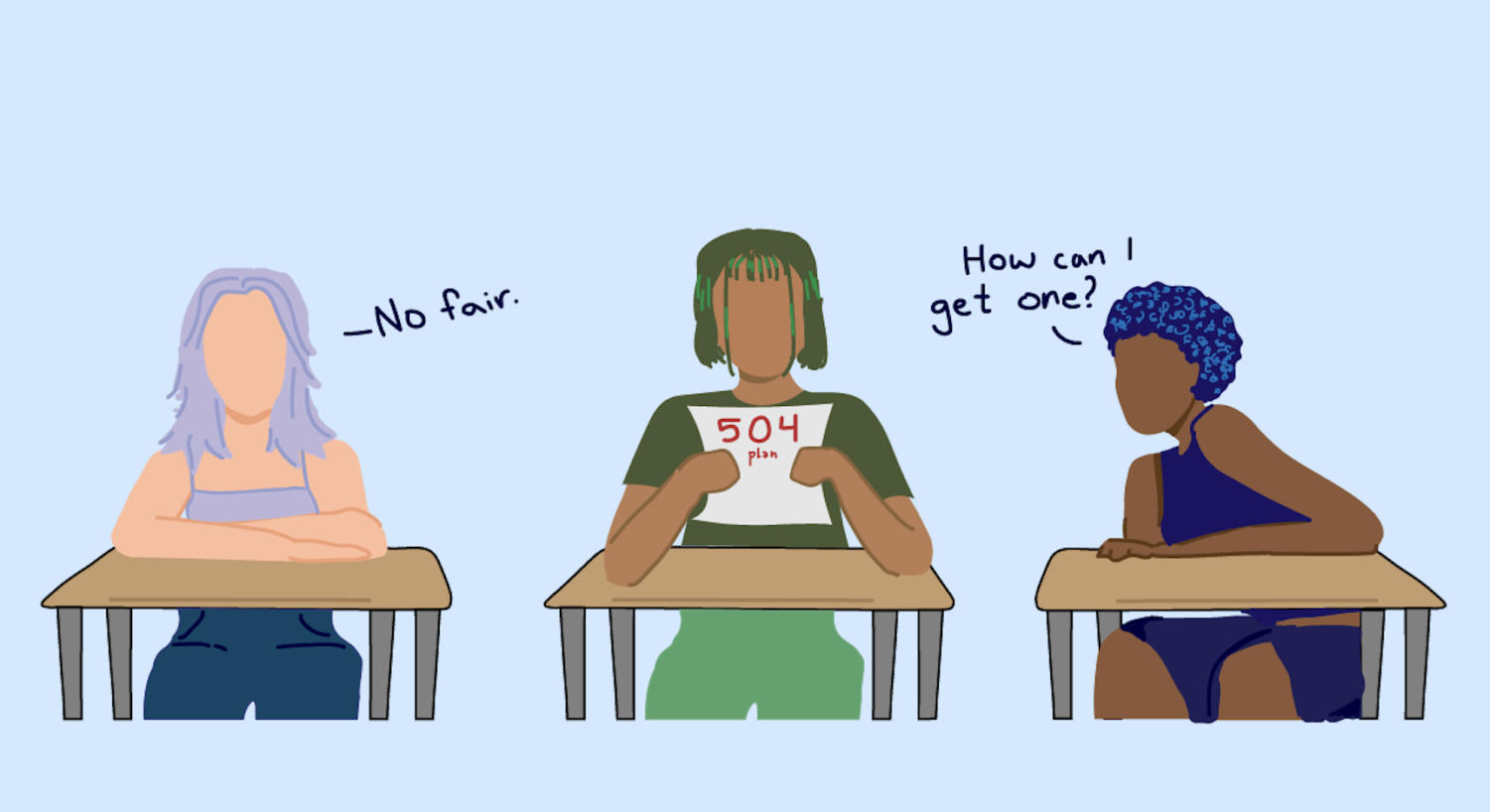Students with disadvantages that adversely impact them in a classroom may have 504 plans to help them learn and receive equal access to an education as their peers. Section 504 of the Rehabilitation Act of 1973, a law that prevents discrimination against people with disabilities, requires that U.S. public schools provide accommodations in the form of 504 plans for students with hindered learning abilities. Accommodations under 504s can include extended time on tests and assignments, modified assignments and leniency with absences and tardies.
To obtain a 504 plan, a counselor sends documents for the parents, teachers and healthcare providers to complete. Then the proposed plan and accommodations are given to a 504 review team to approve or deny. However, some students think that aspects of 504 plans warrant improvements.
Junior Jack Budden (he/him), who has had his 504 plan for three years, expressed that the process was lengthy and complicated.
“We were getting super frustrated for months because the district just didn’t want to approve my plan; it wasn’t a priority for them. It really aggravated my parents because they had to take time off to try and get it sorted,” said Budden.
On the other hand, sophomore Ainsley Oleson (she/they) has had a 504 plan for about a year and noted that the process didn’t feel as tedious, despite it taking them a similar amount of time as Budden.
“I would happily go through it again. It definitely makes a drastic impact on a lot of people’s lives,” said Oleson. “I don’t think I would be able to attend a public school without one.”
Counselor Devin Blanchard (she/her) said that she has also seen students and families try to qualify for a 504 when there was no real need for it because it can be viewed as a tool to get straight A’s. In reality, 504s are implemented strictly to level the playing field, not let students get ahead of others. Often, schools are more skeptical about accommodation that begins in high school because disabilities are usually identified earlier in a student’s academic career. As a student, Oleson also noticed that students sometimes view 504s as a tool to take advantage of.
“I’ve been told that I’m lucky for getting time on work, or asked how they could get a 504 plan if they didn’t need it — like, ‘What would I have to say to my counselor to get a 504 plan?’ which really shows that people are willing to take advantage of these accommodations made just so other students are treated equitably,” said Oleson.
Blanchard said that parental consent is necessary for a student to get a 504 plan. When a teacher or other adult recommends that a student should have a 504 plan, but the parent or guardians do not approve, there is nothing that the counselors can do.
Every student’s 504 plan varies, since each one includes different accommodations appropriate for the student’s disability and needs. Oleson’s allows them to get excused attendance if they can’t make it to class because of pain. Sophomore Reith Harper’s (he/him) plan lets him to take breaks from certain projects.
After completing the process of getting a 504 plan, students may have to deal with the negative stigma surrounding disabilities and receiving help. Many students struggle to keep their 504 private in the classroom setting despite the fact that teachers are required by law not to disclose students’ health information. Oleson said that they had a teacher who left a binder with the names of all the students with 504 plans sitting out on their desk, which made Oleson feel a little uncomfortable.
“There are a couple of my teachers who will make it very clear that I am getting an accommodation because of my 504 plan, which personally I don’t mind, but I can see how other students could mind,” said Oleson. “I have other teachers who are quite discreet about it and will just use email if they need to contact me about it, which is a little bit more comfortable.”
On the other hand, Senior Riley McQuade (she/her) has had mostly positive experiences with her teachers accommodating her 504 plan.
“As long as you’re being respectful in class and trying your best, teachers — especially in Inglemoor — are so happy to accommodate you in my experience, whether you have a 504 or not,” said McQuade.
However, Oleson noted that the communication between students with 504 plans and teachers needs to improve.
“Not necessarily the 504 plan itself needs to be changed, but the action that teachers have to take to follow them should be changed, and maybe have more training with teachers about disabilities,” said Oleson.
Oleson said that she thinks that people need more general education and knowledge about 504 plans and the difficulties that often follow them inside and outside of the classroom.
504 plans can follow students to college if they request it. Blanchard said that after a student leaves the world of academia, they can use a 504 plan in the workplace. Noting that students with lifelong disabilities will have to face the stigma surrounding receiving accommodations, she said in her opinion the goal of a 504 is to no longer need it in the future and for a student to not need extra support after some time.
Above all, students noted that one of the biggest benefit of 504 plans was the fact that they supplied relief.
“It provided reassurance that this is normal and that I can be successful in school.”












